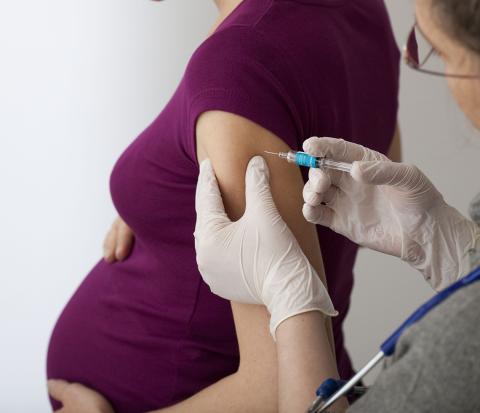No Elevated Risk Found
Flu Vaccination During Pregnancy Saves Lives, Says Wilcox

Growing evidence shows that flu vaccination during pregnancy is safe for mothers and their children, according to a recent editorial in the journal BMJ by Dr. Allen Wilcox, NIEHS scientist emeritus, and Dr. Siri Haberg of the Norwegian Institute of Public Health.
Yet, in the 2017-2018 flu season, less than half of pregnant women in England were vaccinated. Comparable rates were found in the U.S. and Europe, the authors noted. Their editorial addressed a new study on the long-term safety of the flu vaccine for children exposed in the womb. The authors of that study analyzed Canadian health care data for more than 100,000 women pregnant during the 2009-2010 flu pandemic and records of their children’s health up to 5 years of age.
The researchers reported no elevated risk for cancer, infections, neurodevelopmental problems or chronic diseases in the children of vaccinated mothers. These findings are consistent with results from other, similar studies, according to Wilcox and Haberg. “The net result is a resounding lack of evidence for harm from flu vaccination in pregnancy,” they wrote.
The coauthors emphasized that findings about the benefits of vaccination during pregnancy require a strong response from the medical community.

Photo: Steve McCaw
“In our role as researchers, we are obliged to question the strength of the evidence, probe its weaknesses, parse its conclusions and weigh its total contribution,” they wrote. “As physicians entrusted with the health of individuals and populations, we have a different role: When the facts allow, we are charged with speaking out loudly and clearly. Vaccination of pregnant women saves lives.”
Pregnant women who get the flu are at increased risk of complications such as difficulty breathing, pneumonia, sepsis and, in severe cases, multiorgan failure.
Global outbreaks can make problems worse. During the 2009 H1N1 pandemic, 5 percent of all flu-related deaths occurred in pregnant women even though they made up only 1 percent of the population.
Flu infections can also have serious consequences for the pregnancy itself, including miscarriage, stillbirth and preterm birth. For example, some research suggests that risk of preterm birth tripled among infected women who were hospitalized during the 2009 H1N1 pandemic.
“Vaccination of pregnant women averts a small but serious risk of dangerous complications and death for the mother and a chance of death for the child,” Wilcox and Haberg wrote. “A fear of harm to the child is ungrounded—children have no remotely comparable risk.”—Marla Broadfoot
